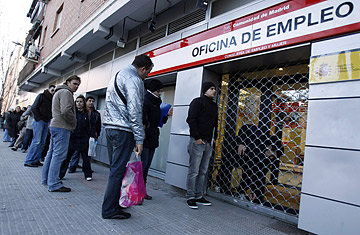
Unemployed workers wait outside a government job center in Madrid
You know your country's economy is in trouble when the Finance Minister travels to a foreign country to seek out that dying breed known as the daily-newspaper editorial staff. That's exactly what Spanish Finance Minister Elena Salgado did on Monday: she flew to London to speak with the editors of the Financial Times. As the economic news out of Spain has only worsened in recent weeks, the British paper has gone so far as to suggest that the country poses serious risks for the rest of the euro zone. Now the Spanish government has embarked on a campaign to convince the paper — and the rest of the financial world — that the worries are unjustified.
While other European nations like France and Germany — and even Britain — are beginning to show signs of economic growth, Spain remains stuck in recession. Results from the fourth quarter of 2009, which will be released on Thursday, are expected to show 0.1% contraction in gross domestic product, which would make Spain the only G-20 country not to have experienced expansion during that period. In fact, the International Monetary Fund has predicted that Spain will remain mired in recession until 2011.
Other recently released statistics are just as grim. In January, unemployment reached 18.8%, the highest level by far in the European Union, where the average is 9.5%. Although still lower than the E.U. average, the debt-to-GDP ratio has also doubled in the past year, to 55%. "The are significant problems in Spain," says Fernando Broner, an economist at the Barcelona-based Center for Research in International Economics. "And we may find out there are even more corpses buried. We hear a lot about how Spanish banks were prevented from purchasing American toxic assets. But they've managed to create their own toxic assets."
Spain's difficulties stem from its once disproportionately inflated housing and construction industry, which has been particularly hard hit by the global economic downturn. When unemployment skyrocketed in the wake of that industry's collapse, the government responded by spending billions on emergency job-creation plans. Now it has a deficit of 11.4% to show for its efforts — one of the highest in the E.U.
Analysts say that Spain's deficit, coupled with the debt problems in other Mediterranean countries (Greece, for one, has a deficit of 12.7%), poses a serious threat to the stability of the E.U. "The euro zone could drift, essentially with a bifurcation, with a strong center and a weaker periphery," New York University economist Nouriel Roubini warned last month at the World Economic Forum in Davos, Switzerland. Paul Krugman, a Nobel Prize–winning economist, didn't help matters when he wrote in his blog for the New York Times on Feb. 2 that "the biggest trouble spot isn't Greece — it's Spain." Fears about rising deficits in those two countries and Portugal triggered a drop in European markets at the end of last week; Spain's IBEX fell to its lowest level in 14 months. The Dow Jones industrial average also closed below 10,000 for the first time in three months on Monday because of concerns about the debt loads in the three countries.
But not all analysts believe that the comparisons with troubled Greece, whose attempts at budget reform are now being strictly monitored by the E.U., are fair. Broner says there's an important quantitative difference between the two countries. "Spain would need six or seven years of deficits to be in the situation Greece is in," he says. And Sara Baliña, a Spanish economics expert at the Madrid-based consortium International Financial Analysts, notes that although the markets are punishing both countries for a lack of credibility when it comes to deficit reduction, Spain is in a better position to right itself. "It wasn't very long ago that Spain actually had a surplus," she says. "Its savings rate is still respectable. It's been able to take measures that are proving to be effective."
That's exactly what the Spanish government is trying to prove. Last week, it announced an austerity plan that would raise the retirement age from 65 to 67 and would cut 50 million euros ($68.5 million) from the budget by 2013 — enough, it says, to reduce the deficit to an E.U.-mandated 3%. And in London on Monday, Secretary of State for the Economy Jose Manuel Campa, who traveled with the Finance Minister and held his own meetings with the media, assured investors that the government was prepared to make even more cuts if necessary.
But doubts remain. Although the International Financial Analysts firm has run simulations showing that the proposed budget cuts are feasible, it sees the government's projected income as "optimistic." And after years of rigid job protection, and with unions already threatening strikes, many question whether the government will have the backbone to enforce the reforms, and whether, on their own, they will be enough.
"Those measures are important to prevent a fiscal meltdown, but they're not enough to get the economy back on track," says Daniel Gros, director of the Brussels-based Centre for European Policy Research. "If it wants to do that, Spain is going to need to either cut wages or increase the workweek. And because of the oversupply of housing, it's going to have to get used to the fact that its economy could be weak for a very long time."
